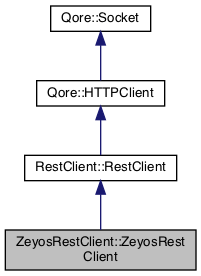 |
Qore ZeyosRestClient Module Reference
1.0
|
 |
Qore ZeyosRestClient Module Reference
1.0
|
this class provides the REST client API for communication with zeyos.com's CRM ERP system More...

Public Member Methods | |
| constructor (hash options, *softbool do_not_connect) | |
| creates the object with the given options More... | |
Static Public Member Methods | |
| static hash | getOptions (hash options) |
| returns options for the RestClient::constructor() | |
this class provides the REST client API for communication with zeyos.com's CRM ERP system
This class requires the following options for zeyos.com's authentication and authorization to the target server:
name: the zeyos.com's namepassword: the zeyos.com's passwordidentifier: the zeyos.com's identifierappsecret: the zeyos.com's appsecrettoken: the zeyos.com's token, if provided then name, password, identifier and appsecret are not needed and will be ignored.The ZeyosRestClient class will receive a token that will be used in further communication. Also the token can be provided directly in the options and then there is no need to pass the above options.
| ZeyosRestClient::ZeyosRestClient::constructor | ( | hash | options, |
| *softbool | do_not_connect | ||
| ) |
creates the object with the given options
| options | valid options are:
|
| do_not_connect | if False (the default), then a connection will be immediately established to the remote server |
| RESTCLIENT-ERROR | invalid option passed to constructor, unsupported data serialization, etc |
| ZEYOSRESTCLIENT-ERROR | missing or invalid required option for Zeyos.com's REST authentication or communication |